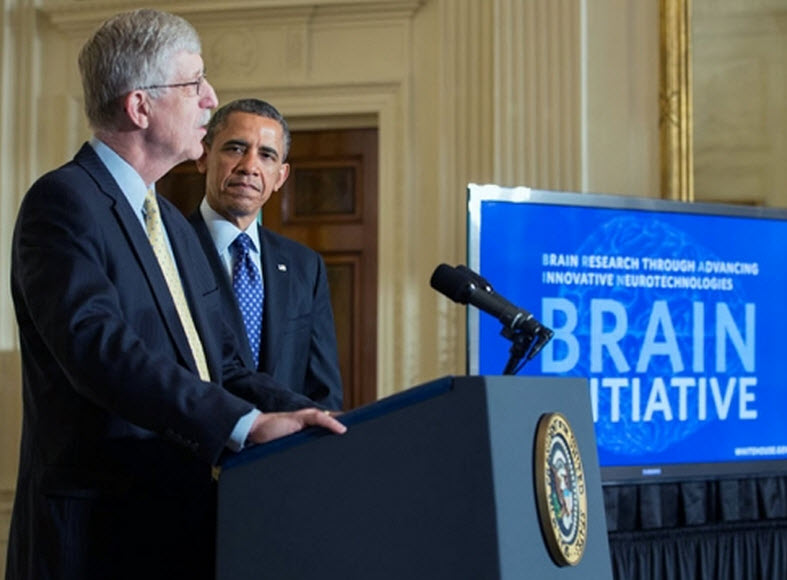The BRAIN Initiative: BAM or BUST?
April 9, 2013

President Barack Obama is introduced by Dr. Francis Collins, Director, National Institutes of Health, at the BRAIN Initiative event in the East Room of the White House, April 2, 2013 (credit: Official White House Photo by Chuck Kennedy)
What is the BRAIN* Project about? What are its goals?
“Well, nobody knows, actually. I certainly don’t know. But it appears that no one else knows either.” So says Scicurious, a PhD in Physiology and currently a postdoc in biomedical research, on her The Scicurious Brain blog on Scientific American.
“Basically, BRAIN is a very fancy initiative, with a fancy name … and so far, no goals,” she says. “When they first announced the BRAIN project, there was some mention of mapping out all the connections in the human brain. That’s around 100 TRILLION connections made by 85 billion neurons. It’s a Herculean task at best.
“But the brain connections are more than individual, they are always CHANGING. Everything changes your brain. Whether you’re stressed, what languages you speak, whether you ate breakfast. All of these things, even the smallest, can change small connections in your brain and alter your future responses and behavior. So a map of all the connections in a healthy human brain (probably an adult male of around 35) from which we can determine who deviates from the norm and what that means? It’s an idea that is doomed from the beginning.
Furthermore, “the timeline on the BRAIN initiative is currently 10 years … really not that long. … We don’t know what the goals are, but I think the ‘dream team’ better be very careful coming up with them, or in 10 years we’ll we looking at a pile of empty promises.”
Is this really going to be the great job creator?
“How will the funding be balanced? Is this going to be the rich old labs with the rich old guys getting richer, with more postdocs and grad students under them? If so, where will those postdocs and grad students be in 10 years if the initiative is gone? …
“There are too many trainees and not enough tenure track research jobs for them. Many will go on to do other things, things that their scientific training has often ill-prepared them for. And this will continue to happen with the BRAIN initiative, unless the funding is structured to provide for younger investigators.”
We’d like to hear from neuroscientists and other experts on this (we will honor all requests to be anonymous). Exactly how realistic is the project and what should its goals be? Contact us at [email protected]. — Editor
* (Brain Research through Advancing InnovativeNeurotechnologies)